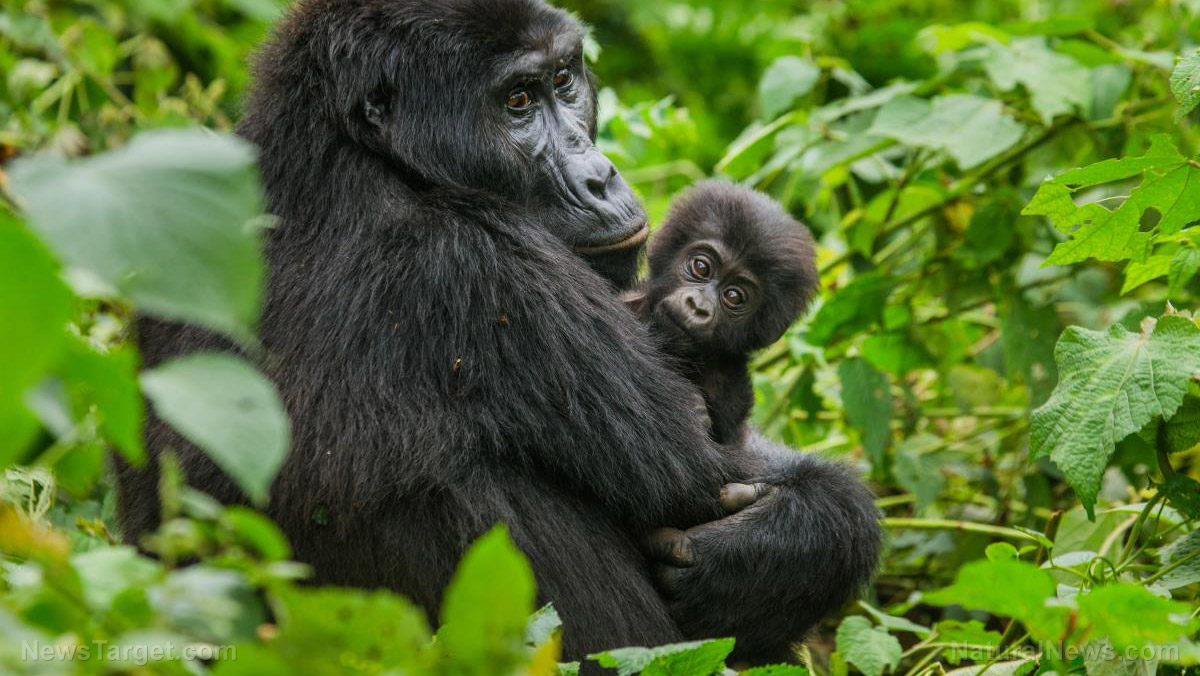Evidence of "funerals" in gorilla society? Video shows baby grooming dead mother's body

(Natural News) Humans aren’t the only ones who mourn for their departed loved ones. A recent study showed that eastern gorillas also held funerals for their dead, even if the late animal wasn’t directly related to their band.
These grim routines included healthy animals touching and licking the corpse. Experts worried that Ebola and other infectious diseases might spread this way among gorillas.
Researchers kept track of bands of different subspecies of eastern gorillas in Rwanda and Congo. When one of the animals died, the apes would crowd around the corpses and groom them as if the bodies were still alive.
The most moving scene recorded by the study involved a young gorilla that just lost its mother. The orphan prodded and cleaned the body of its dead mother. (Related: Scientists study the unique reproductive system of the African pouched rat, a clever animal used to detect land mines and tuberculosis.)
Gorillas mourn for both dead relatives and strangers
In the Rwandan-based part, the researchers observed mountain gorillas (Gorilla beringei beringei) around the corpses of a dominant adult male named Titus and a dominant adult female named Tuck. Both deceased animals belonged to bands that lived in Volcanoes National Park, Rwanda.
They also followed the activity of a band of Grauer’s gorillas (Gorilla beringei graueri) in Kahuzi-Biega National Park in the Democratic Republic of Congo. This group encountered a dead adult male that was unlikely to be related to its members.
The researchers predicted that gorillas were more likely to interact with a dead member of their band as opposed to a stranger that didn’t belong to their social group. As such, they expected the Rwandan gorillas to perform mourning rituals for their dead relations while the Congo gorillas were less likely to do so.
Sponsored solution from CWC Labs: This heavy metals test kit allows you to test almost anything for 20+ heavy metals and nutritive minerals, including lead, mercury, arsenic, cadmium, aluminum and more. You can test your own hair, vitamins, well water, garden soil, superfoods, pet hair, beverages and other samples (no blood or urine). ISO accredited laboratory using ICP-MS (mass spec) analysis with parts per billion sensitivity. Learn more here.
However, the gorillas surprised them by treating all the corpses in almost the same way. In all scenarios, the animals sat near the body and watched over it. They also groomed, poked, sniffed, and even licked the dead animal.
Close friends and relatives of dead gorillas grieve the most
Among the Rwandan mountain gorillas, the individuals with the closest social relationship to the dead animal spent the most time physically touching the body.
In the case of the late Titus, he formed a bond with a young male whose mother departed the band six months ago. For days, the younger gorilla stayed near his corpse and even slept in the same nest as the body.
As for the deceased Tuck, her young sons Segasira and Urwibutso interacted the most with her corpse. Segasira sat and laid himself on Tuck’s corpse, stared at her face, and attempted to move her head.
Although already weaned, Segasira also attempted to suckle from the corpse. Distressed animals went through the motions of “comfort nursing” because it released a hormone that reduces the effects of stress.
Tuck’s other son, Urwibutso, hooted and beat his chest over her corpse. The researchers believed that such aggressive behavior indicated frustration in gorillas that are trying to wake up their dead relative.
Gorillas’ mourning behavior may help transmit diseases like Ebola
Meanwhile, in the Congo, the Grauer’s gorillas surrounded the corpse of the stranger. They spent 17 minutes observing, sniffing, and licking it. The animals also licked their fingers after touching the body.
The study provides new data on how animals saw and responded to death. Further, it may also affect conservation efforts for gorillas.
Corpses are a vector for transmittable diseases like Ebola. If gorillas frequently touch an Ebola-infected body, they may contract the virus, which kills as many as 95 percent of all infected gorillas.
Sources include:



